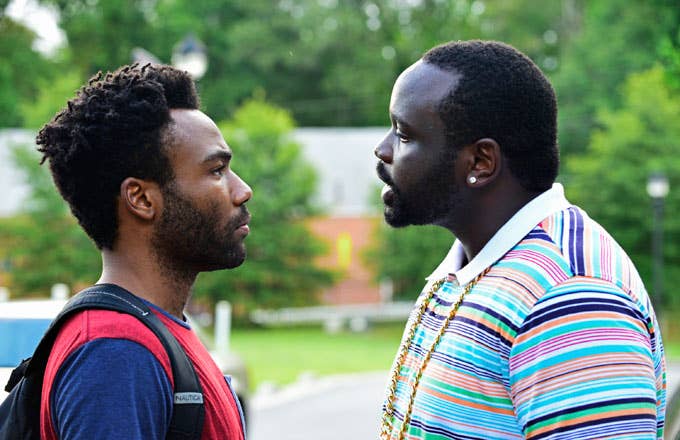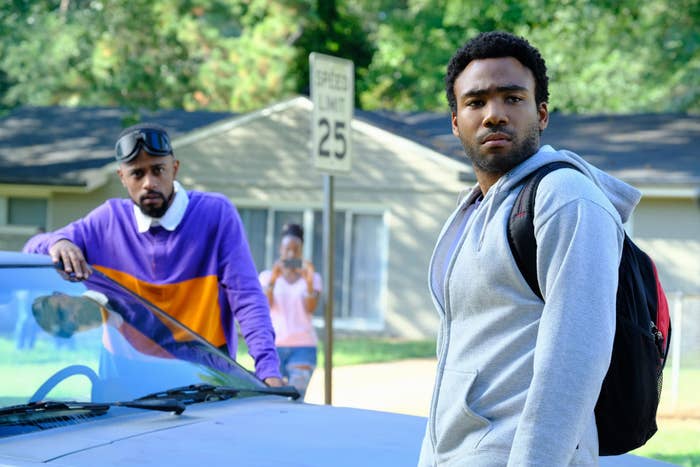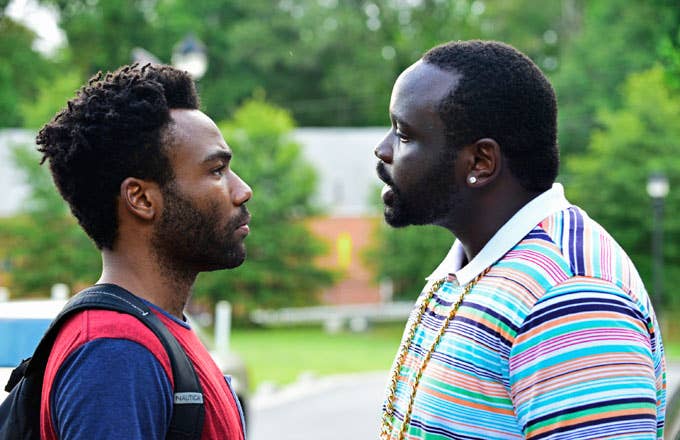
As Atlanta's music supervisors discuss the process of putting together the show's soundtrack, they keep bringing up the same word: "feeling."
The music that ends up in the show isn't the result of a carefully calculated plan. Ideas flow freely from a crew of writers, editors, and directors who all have deep musical roots. Jen Malone and Fam Rothstein don't care who comes up with a song idea, as long as it's authentic to the feel of the show.
"It's very organic," Rothstein explains. "It's just the stuff [the crew] is listening to. It's the music their little sisters and brothers are listening to. It's the stuff people are riding with in their cars."
Set in Atlanta, the show borrows heavily from the sounds of the city, but Malone and Rothstein happily pull from other regions as well—as long as the feel of the music matches the energy of Atlanta. "We also listen to Curtis Mayfield," Rothstein says. "We also listen to Yellow Days. Because to me, when I hear a kid like that who is across the pond and he's seventeen, it's the same feeling that I get from a kid in Atlanta. They're making different music, but they have the same DNA to me."
"It’s all about authenticity. When there's a scene taking place at a strip club, we're going to place music that's being played right now at the strip clubs," Malone adds, referencing Atlanta's Onyx nightclub.
The internet has flattened the listening experience for fans across the world, and Rothstein says he feels a responsibility to bring that mentality to television as well. "On the internet, Tay-K and Kodak Black are being heard by Swedish kids at the same time that a kid from Florida probably hears it, because they're both getting it from the same medium," he explains. "So I think it's my duty in terms of the show to amplify this music and give it a megaphone."
The show's core group of writers, editors, and directors have been working together for years alongside Rothstein—who is also Donald Glover's manager—but Malone entered the picture during the first season of Atlanta. Coming from a background as a publicist for rock groups, Malone brings a fresh perspective to the team. "We make a really good team because we come from different musical backgrounds," she says. "Creatively, it's a really fun process because [Fam] will come up with ideas I've never thought of and I'll come up with ideas he's never thought of."
Continue for our full interviews with Malone and Rothstein below and learn more about the music in Atlanta Robbin' Season—which premieres March 1 on FX.

The writers of Atlanta seem committed to breaking the rules and doing things that aren’t normally seen on TV. Do you approach the music side of things the same way?
Fam: Absolutely. Everybody has their own tastes, obviously. But for me, I always like syncing music that hasn't been synced before. Like, regional music that the world hasn't heard of yet and kids that might not have the infrastructure to even get their music on a TV show. I think a lot of what's dope with what Jen's able to do is she can help walk people through that process. If you have a kid from Dade County in Florida, maybe other music supervisors wouldn't walk them through the process of getting their publishing splits done and everything.
We don't want to put limitations on who we choose to expose, though, whether it's on a micro or macro level. I really do fuck with a lot of Atlanta music, but you have to expand the world a bit, too, and always look at who hasn't been touched before. Everybody's kind of listening to the same thing now—it's this cultural Pangaea. On the internet, Tay-K and Kodak Black are being heard by Swedish kids at the same time that a kid from Florida probably hears it, because they're both getting it from the same medium. So I think it's my duty in terms of the show to amplify this music and give it a megaphone. Because they might not have that opportunity.
On the internet, Tay-K and Kodak Black are being heard by Swedish kids at the same time [AS] a kid from Florida...they're both getting it from the same medium. it's my duty in terms of the show to amplify this music and give it a megaphone.
You guys have now finished two seasons of Atlanta. When it came to selecting music for the show, were there any big differences from the first season to the second?
Fam: The tone of the overall season changed. It's a lot darker in general. So I think there are certain flavors and notes that we make sure have some sort of connection to the identity of each episode. But for the most part, you can see parallels between Season 1 and Season 2 and the identity that we're forging with the show overall.
Jen: Creatively, there’s no one going, "We're going to make the show sound like this." We're not actively doing something different or the same from Season 1. We're just finding the music that helps the story. We place the music that fits the picture and creates these musical moments. We pick the music that helps the audience think and feel what our characters are feeling.
For me personally, when I started Atlanta on Season 1, I didn't know the hip-hop scene or the trap scene very well. That just wasn't the world I lived in. Not only the style of music, but also how that world works, as far as working with the producers and the artists. So, on both the creative and the clearance ends, I was thrown into the fire. But this year, for example, if I can't find a rapper who has passed away, I know who to call to get the estate's information.
I have such a great network of people in Atlanta now who can help me find the right people, because half of this job is finding the right information and people. Now I have a network of managers, DJs, label owners, and artists who help me get it done. On the creative side as well, I've now worked on a couple other shows that take place in Atlanta, so I haven't really left that region very much in the last year and a half.
The show has a lot of Atlanta-based music in it, but you include artists from other areas as well. How much of a priority is it to use Atlanta-based music in the show?
Fam: It's always just what fits, but we have a team of writers from Atlanta. Specifically Swank [Jamal Olori] and Stephen Glover—they're very Atlanta. Like, what they listen to is what's being played in strip clubs and what's being played at a friends' house. I think it starts there, but I don't think we've ever been pigeonholed to be like, "We need to represent Atlanta in this way."
It's very organic. It's just the stuff they listen to, and it's the stuff their little sisters and brothers are listening to. It's the stuff people are riding with in their cars. So, you want some representation of that, but you also don't want to limit yourself. We also listen to Curtis Mayfield. We also listen to Yellow Days. Because to me, when I hear a kid like that who is across the pond and he's seventeen, it's the same feeling that I get from a kid in Atlanta. They're making different music, but they have the same DNA to me. So, we definitely want to represent Atlanta, but we want to access different flavors for everybody, too.
Jen: It’s all about authenticity. When there's a scene taking place at a strip club, we're going to place music that's being played right now at the strip clubs. A lot of these artists just happen to be from Atlanta. I don't think there's a hard and fast rule that we have to use artists from Atlanta. It's always about the song. It's not about the artist or where they're from, or even what time period they're from. It's just about fitting the song to the scene. We maintain authenticity to what Alfred would be listening to or what's going to be playing at Onyx.
What would you say is the biggest thing that music adds to this show? If all of your song selections were replaced by stock music, what would the show be missing?
Fam: It changes, man. A lot of this show is driven by feeling and tone. You just want to go with what feels good in the moment. So you may look at the colors and think, all right it's super glossy, what does gloss feel like? Or it's super humid, what does humidity feel like? Whatever the moment is given is what you want to project. I think we're driven overall by tone and feeling when it comes to this show. And if you stripped away any dialogue, I think you would want to watch it and feel something the same way.
It’s all about authenticity. When there's a scene taking place at a strip club, we're going to place music that's being played right now at the strip clubs.
The show itself is centered around music and Donald Glover obviously cares about music a lot. How much say does he and the rest of the writers have in the song selections?
Jen: We have an amazing team and all of us work on the music. There are definitely some songs that are scripted in from the very beginning. Most of the time, those are songs that Donald wants to see or that Steven Glover is hearing when they're writing that scene. So, then we go and get those.
Other times, it's just our editors Kyle Reiter and Isaac Hagy, who are amazing. What's so great about them is that they edit picture to music, as opposed to having a scene and just sticking a song in. We don't have a music editor and we don't have a composer. So we work very differently than other shows in that way.
It's Hiro Murai and Donald's vision at the end of the day, so if they're not feeling something, Fam and I will go back and find something that fits the scene. Steven also has amazing tastes and he knows Alfred's musical tastes really, really well. There are really no rules. It's not like we have to pick a trap song in this spot or try something old school somewhere else. It's just what fits. We all work together and there's no ego involved in picking the songs for the show, which is amazing. It's not like, "Oh, that was my choice." It's just about what's the perfect song for the moment. We all pull from each other's playlists, which are all very different.
Fam: Everyone on this show has their own input. It's always about sticking to an overall tone. Episode to episode is written by different people. But in those rooms, there are different contributions. So, there's a tone that's established, then you follow that tone. It's not necessarily Donald coming in and nitpicking and being an editor and a coach. It's about following a tone and a feeling.
Isaac is a big music guy. Hiro and Isaac and all of us have been working together since 2013 when he did the short film Clapping For The Wrong Reasons. We're all driven by that. We're all music-centric. It's about a feeling, but it's also about being able to understand their sensibilities as editors and directors. They need choices to be able to communicate a feeling. They listen to enough music to know what it needs.
Hiro is such a visual guy. There's this one Earl Sweatshirt video he did where there's two dogs fucking behind a gate. It's such a weird moment, but it fits the music so well. You have moments like that, where it's literally your four-year-old self, being like, "Okay, I don't know what's happening, but I know how I feel about this." Hiro's really good at that. And Isaac as well. They've been working together longer than us. Their relationship pre-dates all of us really.
What is your research process like for this? How did you go about discovering music that would be a good fit for the show?
Jen: Again, when I started, this wasn't my wheelhouse. So I dove in and did as much research as I possibly could. Just reading anything and everything that was written on blogs and finding everything I could about the scene and who the influencers and artists are. I definitely go down the SoundCloud rabbit hole. The DJs, managers, producers, and artists I've connected with from Atlanta—they're always feeding me music as well. So I'm in deep [Laughs].
a lot of this show is driven by feeling and tone. We just want to go with what feels good in the moment.
How does the music supervision process work between the two of you?
Jen: We’ll be in spotting sessions together and go through all the music in each episode. We'll pull some songs and pick out the best ones to send over to the editors to pick. We'll send them one playlist with the best, then they'll choose one and I'll take care of the clearance.
Fam is amazing. He has such a vast musical knowledge and to be able to work with him is very special. We make a really good team because we come from different musical backgrounds. Creatively, it's a really fun process because he'll come up with ideas I've never thought of and I'll come up with ideas he's never thought of. We're really open to each others' ideas. Everyone on this show is. We're all pulling from 15 different playlists from people who have really interesting tastes. That's why the show has such a different musical identity.
Getting a song placed on Atlanta could end up being a huge moment in a young artists’ career. After Season 1, did you hear any stories of artists' careers changing after they were included in the show?
Jen: The biggest one was Migos. They were buzzing when they were in the show. Then when Donald won the Golden Globe, he talked about "Bad and Boujee" right before that was the biggest song in the country. Migos was a prefect example, but it happened for some of the independent artists, too. I keep in touch with them. It's important to me that when we work with an independent artist, they understand this process. Nine times out of ten, they're not going to know how music licensing works. It's a very complex thing and most of these artists don't know about copyright ownership and things like that. So I keep in touch with them. Xavier Wulf went on to get an admin deal, and his producer did, too. There were a couple others. I think Doe B's music had a little bit of a resurgence as well.
Do you think about that when choosing the music? That you can use the show to introduce people to great new music they might not otherwise find?
Jen: There are a lot of artists in Season 2 who are kind of on the verge. With a placement on this show, it’ll expose them to a bigger audience. So, not only is it helping our show, but it's also helping independent artists as well. That's a fun part of our job.
Fam: I’m aware of the platform, but I don't know if it's my biggest aim to just launch artists. If they stick, they stick. I do like being able to put them out there, though. We feel like we have good taste, so it's like, let's see how people react to this. I like giving some of these artists a platform that they might not have had, but I don't think the objective is to blow them up. The objective is to share good music and find stuff that fits the show.
We get to work with the best people in the business. There's a lot of mutual respect between the team. It's very much a collaborative team, creatively.
Were there any major songs you weren’t able to clear in the second season?
Jen: There’s one song this season that we couldn't get because there was a master sample from a 1974 film and we don't know who owns it. The film was at Paramount Pictures and they sold it back to the director, who passed away in 2014. I found his widow and talked to her. She was lovely, but didn't have the paperwork for who owns it. I believe it was lost in a flood. So they can't claim it, and we can't use it. Everybody was bummed, but we did everything we possibly could.
Do you have a favorite music-related moment in the second season?
Jen: At this point we're halfway through. We haven't finished the season. We're on episode 207 on my end. They're editing all of the episodes, but as far as making final music decisions and getting clearances, that's where we're at. There are some amazing music moments that have blown me away, though. One is in episode 205, where there's an amazing end song that our editor Isaac pulled. When I heard that, I thought it was genius. I was very happy to tell him that I cleared that one. Episode 206 is going to be a really great episode and Donald has two really special songs that we had to go a little deeper and a little above and beyond to get the rights to. But we got them at the end of the day and those songs are perfect.
Fam: There’s a lot of shit. But since episode one is about to come out: I really like the original song in a commercial that you'll see. That's pretty funny to me. I also like the opener and the ending. There's this Curtis Mayfield song that we used to close it. It's just one of those things where it's more emotive. It just fits the feeling. I don't want to give away the whole season, though, so I'll stop there.
What's your favorite part about working on Atlanta?
Jen: The collaboration. Just working on the show with amazing people—talented, smart, lovely people that I respect so much. We get to work with the best people in the business. There's a lot of mutual respect between the team. It's very much a collaborative team, creatively, and the music isn't being dictated by one person. Donald is open to my ideas and Fam's ideas and the editors' ideas. That's amazing. And of course, watching the final product and being like, "Damn, this is a really good show." [Laughs]. It's a very, very special show that I'm so grateful to be a part of.





